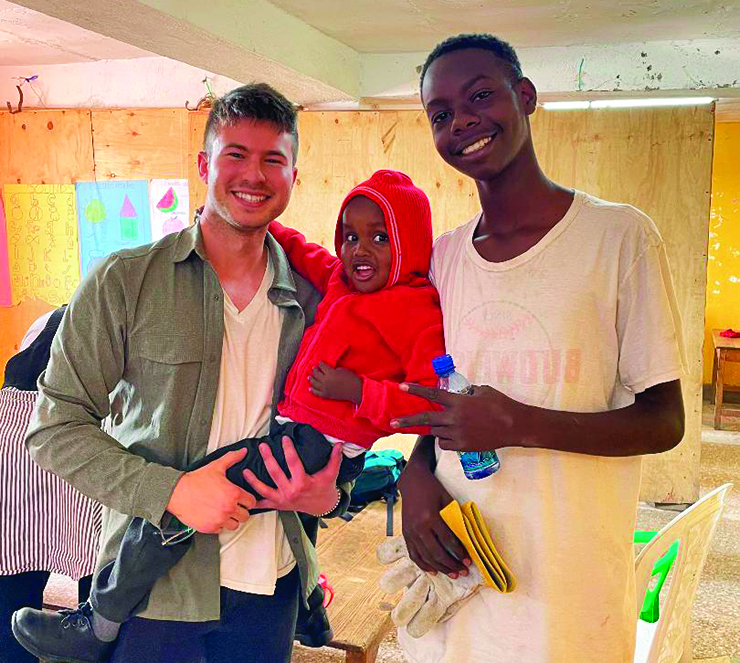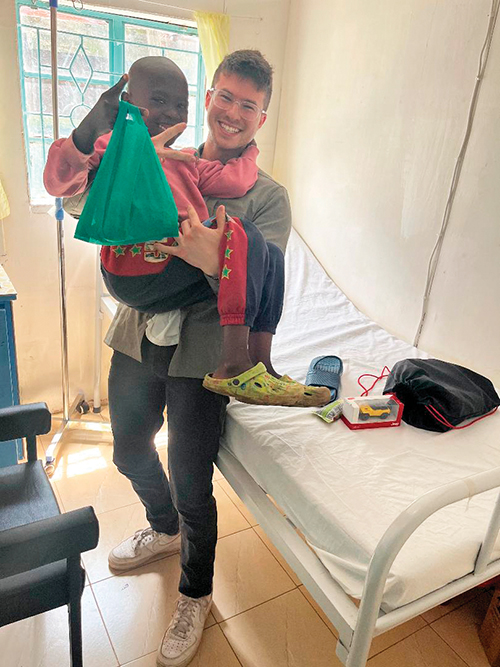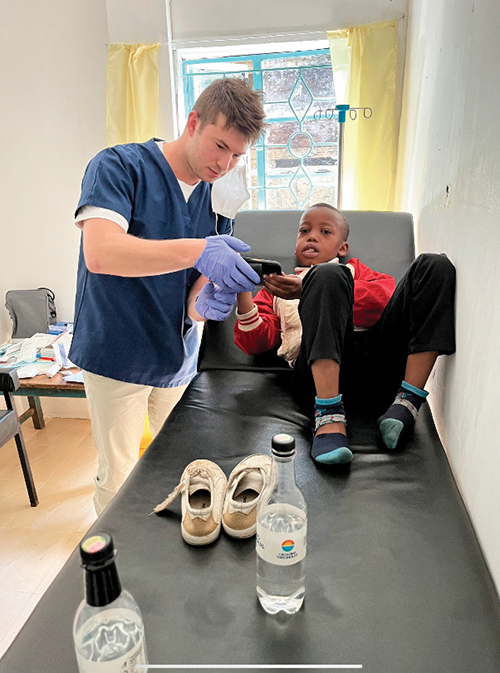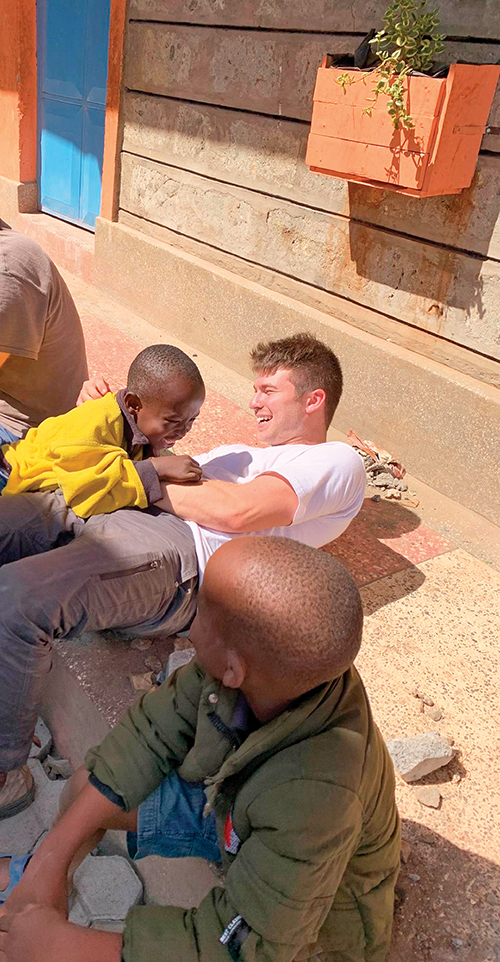22-year-old takes chesed to new heights with ambitious project.

in Kibera.
Matan Brandon Rosenthal grew up in The Bronx and is a 22-year-old student majoring in finance and neuroscience at Muhlenberg College. And Rosenthal is working toward making the impossible possible.
Rosenthal has accomplished much in his young life. His first dream was to become a Navy Seal. To qualify, he became a certified PADI deep-water rescue scuba diver, trained and competed in trap and Skeet, received his FAA pilot’s license, and trained for several years in Krav Maga.
This remarkable young man has volunteered around the world with his family, building a hospital in Haiti after a cholera outbreak following a devastating earthquake, and volunteering in a hospital in the Ecuadorian Amazon. He has traveled with his family to Peru, Alaska, the Dominican Republic, Israel and Africa on medical missions.
Last year, Rosenthal decided to fill a tremendous, life-saving need: building the first medical-dental hospital in the center of the largest slum in Africa: Kibera, a neighborhood in Nairobi, Kenya. Aided by the experiences he shared with his family and generous supporters, his goal is to build a patient-centered, community-supported 6,000-square-foot health care facility, with four floors, housing medical and dental services.

“I remember my first introduction to Africa,” Rosenthal shared with The Jewish Link. “I was 11 years old when my father took me to the Metropolitan Opera to see ‘Aida’ by Giuseppe Verdi. I was fascinated by the cacophony of music and dancing, but the story about an African princess from Ethiopia being kidnapped and enslaved was the most stirring. … Many years later, 7,000 miles away, I found myself sitting on a dirt floor, eating ugali with a Nubian family, in the largest informal settlement of Africa, Kibera, thinking about my first experience with the Nubian princess in Aida.
“How did I get to Kibera? Kenya was not the last stop on the D train that I took from the Bronx to Manhattan, growing up in New York City. There were many ‘stops’ on that subway, taking me to an urban maze of diverse and eclectic experiences that helped prepare me for that ‘last’ stop to Africa. As an independent, wandering and incessantly curious adolescent, I searched for answers to philosophical questions about life, as most adolescents do. Perhaps it was learned or innate, growing up in a family who took me to many of the 17 volunteer missions around the world they completed.”
For Rosenthal, the easy part of building this hospital was setting up a 501(c)(3) nonprofit and website, Docs International Health and Rescue Alliance Ltd.. He had to weave his way through a maze of Kenyan government, legal, accounting and bank account regulations while directing the nascent project from his college dorm room in Pennsylvania.
Using his own funds, which he earned by working summers as a marine mechanic, Rosenthal purchased land in Kibera and the project moved from dream to reality. After numerous 16-hour trips to Kenya during school breaks, he organized an in-house team led by a project manager, two engineers, architects and a construction company, all while pursuing a double major in college.

Then came the difficult part. “The obstacles are complicated, involving external and internal factors. But solutions are attainable and do not require a magical spell,” said Rosenthal.
“I have personally witnessed during my volunteer work in Kibera, building our NGO’s health clinic, that negotiating with tribal leaders, local chiefs, gangs, bureaucrats and politicians can be quite challenging … even though this was a charitable project for their benefit,” he noted.
Rabbi Maury Kelman, Congregation Agudath Achim, Bradley Beach, New Jersey, knows the Rosenthal family and said: “It takes the courage of a lion with the heart of a chasid, to undertake this challenge. Matan was blessed with a genetic inability to stand by while people are in need. I consider this a tremendous Kiddush Hashem, exemplifying the values of caring for others and tikkun olam.
“After I learned of the project, I immediately offered to help Matan. I contacted possible partnerships, from the Giants of Africa program to the Israeli Embassy and other organizations that are working in Africa,” Rabbi Kelman continued. “While hopefully some of these contacts may be beneficial, Matan keeps working incredibly diligently to ensure the continuation of the project, even with limited funds. Matan is a walking Kiddush Hashem, an observant Jew who is constantly growing in his avodat Hashem, while doing his best to literally save many lives. I am hopeful he will inspire others to follow his altruistic path, whether in Israel, Kenya or next door, ideally all three.
“Matan is a tremendous role model at an age when many are much more concerned about their own needs rather than looking outward. helping others. He is following the Torah way to be a shining light of goodness. May God give him and the entire Rosenthal family, who are great role models, the strength to continue to do wonderful things for klal Israel and the whole world.”
Rosenthal said: “ I truly believe any hope of increasing the quality of life in Kibera will require first breaking the psychological cycle of hopelessness and self-fulfilling prophecy of defeat. I am optimistic that I can contribute, lifting these people out of an emotional abyss of misery. … I see myself just as a pawn on the human chessboard of humanity, being responsible to help those deprived of basic human rights.
“I am applying for a Fullbright scholarship after I graduate college to spend a year continuing my work in Kibera,” he added. “I have recently completed an online language course, learning Swahili to help communicate with the community at large.
“The Jewish merit, obligation and imperative to build this hospital in Kibera is deeply rooted in Jewish law,” he continued. “If we ignore those who are suffering from hunger, thirst, lack of clothing, and face life-threatening danger, we are breaking several commandments, similar to rescuing captives. 1:Do not harden your heart or close your hand (Deuteronomy 15:7). 2: Do not stand idly by when the blood of your neighbor is at stake (Leviticus 19:16). 3: Do not force him to do laborious work in your presence (Leviticus 25:53). 4: You must open your hand to him (Deutoronomy 15:8). 5: Let your brother live alongside you (ibid. 19:18). 6: Love your neighbor as yourself (Leviticus 19:18).”

Dr. Alan Rosenthal, Matan’s father, told The Jewish Link: “From an early age Matan’s midos were very evident. He has always been the first to volunteer and help his friends, family and strangers in need. He has an infallible commitment to Judaism and Zionism, davening every day and learning Chumash, Gemara and Talmud. He spent a gap year in Israel learning in yeshiva. Matan has already been on over seven medical missions.
“Announcing to our community that a Modern Orthodox Jewish college student is building a hospital in Africa is very important to a newly ignited contemporary public relations global assault on Jews,” he added. “Matan is exemplifying the mandate of Judaism, tikun olam, pikuach nefesh, loving your neighbor as yourself, not to stay idle while your brother is in need. We want to save the world, the opposite of genocide, which an uncomfortable number of politicians and countries have accused us of.
“Matan has now taken a lead role in building the hospital in Kibera,” Rosenthal’s proud father continued. “It was his idea to drill a water well, 1,000 feet, to supply clean water that was never available for free. I am readily available to assist Matan with advice concerning health care, legal and financial issues. He is a quick learner and capable of problem solving when challenged with difficult situations.”
Rosenthal is committed to finalizing the project and has stated, “I view this as a great sanctification of God’s name as we must do our best to help all people, regardless of religion or background, and there are few people anywhere who are in such need for medical care as the people of Kibera.”
Matan Rosenthal and family are trying to raise awareness of the suffering and lack of human rights in Kibera. Over 1 million people are suffering from food insecurity and lack of access to health care. The Rosenthals have raised over $350,000 so far during this two-year project, but are in need of funds to complete the hospital.
The project’s history and story can be seen on the website: Docs International Health and Rescue Alliance Ltd., Docstotherescue.org or view a short video at https://bit.ly/3YxAiba
Information on how to make donations can also be found on the website, including using GoFundMe and PayPal. To contact Rosenthal, email rescuedocsinfo@gmail.com
Susan R. Eisenstein is a longtime Jewish educator, passionate about creating special, innovative activities for her students. She is also passionate about writing about Jewish topics and about Israel. She has two master’s degrees and a doctorate in education from Columbia University.













